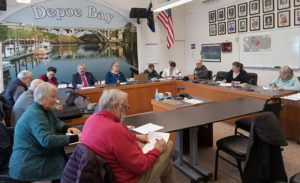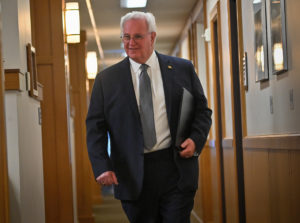
By KENNETH LIPP/YachatsNews
Lincoln County commissioners Wednesday declared a homelessness state of emergency in a bid to be included in a statewide declaration – and possibly get financial support.
In one of Gov. Tina Kotek’s first official acts in January, she fulfilled a campaign promise by declaring a state of emergency to respond to Oregon’s homeless crisis. The executive order directed state agencies to spend tens of millions of dollars and removed bureaucratic hurdles for the Oregon Department of Emergency Management to coordinate response with other state and local agencies.
But the declaration left out Lincoln County and everywhere else in Oregon outside the Portland, Salem, Eugene, Bend or Medford metropolitan areas. County commissioners and coastal legislators protested, and Kotek responded by providing a path for rural counties to be included the state of emergency.
The first requirement is to declare a local emergency. County commissioner Claire Hall said during a special meeting Wednesday they’d recently learned the deadline to do so was Friday, prompting the urgency.
Both Hall and chair Kaety Jacobson noted they didn’t know how much, if any, additional money might come the county’s way if it is included in the declaration, but it was still an important step. All three commissioners voted yes on the declaration and to send a letter to the state stating their case to be included.

Later Wednesday, Hall chaired a meeting of the advisory committee for the county’s intergovernmental homeless response plan, which is funded by a $1 million grant from the state. She updated the committee on the commission’s action that morning, again noting that chances of inclusion in the statewide emergency were unclear, as were exactly what resources it would provide.
Hall said Clatsop County recently won such approval but Wasco County’s application was rejected because it could not show it had a 50 percent increase in homelessness since 2017.
Pegge McGuire of Lincoln City, director of the Community Services Consortium and one of many meeting participants, added to Hall’s point about the uncertainty of potential benefits of joining the statewide emergency pool.
The consortium is the local community action agency, a non-profit with a designated role in government-funded anti-poverty initiatives in Lincoln, Linn and Benton counties.
“The answer is, nobody seems to know,” McGuire said. “It’s like crashing a party,” and the county might be treated like an unwanted guest.
Meanwhile in Salem
The statewide emergency is just one channel through which the county might receive state homeless funds during the current legislative session.
A legislative budget subcommittee voted Tuesday to advance a pair of bills that contain the money for Kotek’s homeless response requests and other related programs to increase housing. Also part of the package is House Bill 2001 that would enable the state to prod cities and the Metropolitan Service District in Portland to plan for more housing production, combined with more help for homeless youths and more notice for evictions based on nonpayment.
The two bills now go to the Legislature’s joint budget committee, which is scheduled to take them up Friday. Assuming approval by the full committee, both bills will go first to the House, and then to the Senate, in up-or-down votes next week.
Between them, they propose spending about $220 million, $30 million of which will come from reallocated money in the state’s current two-year budget, and the rest to come from the next two-year budget that starts July 1.

“What we are doing here today will be regarded as one of the signature packages that we move forward this session,” said Rep. David Gomberg, D-Otis, House co-chair of the budget subcommittee.
Latching on to an analogy by Rep. Kevin Mannix, R-Salem, who likened the package to the launching of ships, Gomberg added: “We are launching ships where boats have gone before — and we have not done enough.”
The plan fully funds Kotek’s request for $130 million, split between the two budget cycles, for temporary shelters, rapid re-housing of people who lose it, and rental assistance and other services to keep people from going back onto the streets.
Lawmakers added $27 million for assistance to the 26 counties not designated in Kotek’s executive order of Jan. 10, when she designated five regions (and 10 counties) where more than 75 percent of the estimated 18,000 in Oregon’s 2022 point-in-time counts of unhoused people originate. Although Kotek said last week the counts are “incomplete,” they also represent the best estimates available.
“I think that ($27 million) is a critical addition for me,” Gomberg said, as well as $25 million for programs for homeless youths. Gomberg said that in his coastal district, an estimated one of every five students has no permanent home. Many of those minors are left out of homeless counts used by the state.
The state’s metric also lumps in more populated areas, such as Albany, Corvallis and Coos Bay, where there is considerable visible homelessness, with counties whose population is less than 1,000.
The bulk of the money proposed will go to the Oregon Department of Housing and Community Services for distribution to local agencies. Some will go to the Department of Land Conservation and Development for planning, and some to the Department of Emergency Management for coordinated emergency response under Kotek’s Jan. 10 executive order.
Gomberg said lawmakers need to do more and will follow through as they work out details of the 2023-25 state budget.
- The Oregon Capital Bureau, a news service of Pamplin and EO Media, contributed to this report.
- Kenneth Lipp is YachatsNews’ full-time reporter and can be reached at KenLipp@YachatsNews.com



This situation will not stop growing until we all work together to find a solution. Tiny houses, mobile homes etc would be nice if we had land